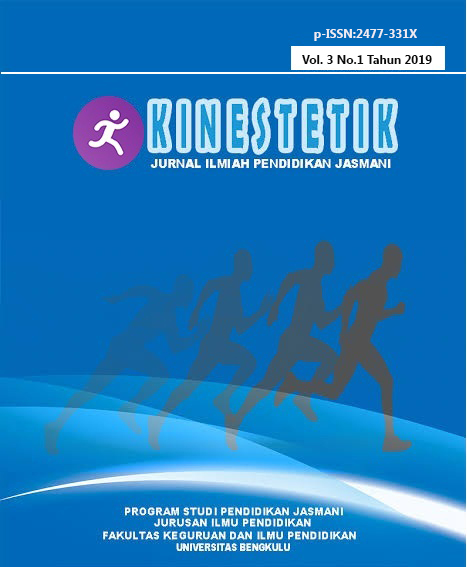Main Article Content
Abstract
This study aims to find out how the Implementation of the Rondo Method to Improve Student Passing Techniques in Futsal Courses so as to improve the learning quality of seventh semester students in Class A Penjas Study Program FKIP Unib. Through the rondo method students are included in groups to practice passing. The hope is that students have an active and contributive attitude so that getting meaningful learning both individually and in groups and improving the quality of learning in Futsal courses is achieved. The subjects of this study were seventh semester students of class A Penjas Study Program FKIP UNIB who were taking the Futsal Orpil course. Data collection techniques were carried out by means of tests conducted at the beginning and at the end of the cycle, there was an increase in the skills of basic passing techniques before and after using the rondo method in the first cycle, which proved to be an increase of 50% of 20 students who received complete grades from 40 students based on details percentage value (A) 12 people, (B) 8 people, (C) 20 people using the rondo method with 1 person being a guard. In cycle II there was an increase in passing skills in the rondo futsal game method with 2 students who became guards. Evident from the results of the study with the results of a 65% increase in completeness from the first cycle which only 50% completed from 40 students with details of the value (A) 16 people, (B) 9 people, (C) 15 people. There was an increase from the first cycle, namely 15% increase with completeness from 20 students to 26 students who completed Futsal learning.
Keywords
Article Details
- Authors retain copyright and grant the journal right of first publication with the work simultaneously licensed under a Creative Commons Attribution-ShareAlike 4.0 (CC BY-SA) that allows others to share the work with an acknowledgement of the work's authorship and initial publication in this journal.
- Authors are able to enter into separate, additional contractual arrangements for the non-exclusive distribution of the journal's published version of the work (e.g., post it to an institutional repository or publish it in a book), with an acknowledgement of its initial publication in this journal.
- Authors are permitted and encouraged to post their work online (e.g., in institutional repositories or on their website) prior to and during the submission process, as it can lead to productive exchanges, as well as earlier and greater citation of published work (See The Effect of Open Access).
- This work is licensed under a Creative Commons Attribution-ShareAlike 4.0 International License.
References
- Aqib, Z. 2006. Profesional Guru dalam Pembelajaran Olahraga. Surabaya: Cendikia
- Harsono. 1998. Choaching dan Aspek-Aspek Psikologis dalam Choaching. Jakarta : Depdiknas
- Kurniawan, Feri. 2011. Buku Pintar Olahraga. Jakarta : Laskar Aksara.
- Lhasana,J. 2011. Taktik dan Strategi Futsal Modern. Jakarta : Be Champion
- Mulyono, Asryardi, 2014. Buku Pintar Panduan Futsal, Banda Aceh : Laskar Aksara
- Sukintaka. 1997. Bermain Futsal. Yogyakarta: FPOK-IKIP Yogyakarta.
- Tarigan, B. 2001.Pendekatan Keterampilan Taktis Dalam Pembelajaran Sepak Bola. Jakarta: Direktorat Jendral olahraga.
- Tenang, J. D. 2007. Mahir Bermain Futsal. Jakarta: Dar Mizan.
- Pembelajaran Kooperatif : Teori, riset dan Praktek. Bandung : Nusa Media.
- Saputra, H., & Sutisyana, A. (2018). PENGARUH LARI BOLAK-BALIK MENGGUNAKAN BEBAN KAKI DAN CIRCUIT TRAINING TERHADAP KEMAMPUAN DRIBBLING PADA PEMAIN FUTSAL JUGADOR ANDALAS FC. KINESTETIK, 2(2), 192-201.
- Siregar, F. M., Yarmani, Y., & Ilahi, B. R. (2018). ANALISIS SMA NEGERI BERPRESTASI DIBIDANG EKSTRAKURIKULER FUTSAL KOTA BENGKULU. KINESTETIK, 2(1), 111-117.
- Siswandi, E., Yarmani, Y., & Sihombing, S. (2017). PENGARUH METODE LATIHAN TEKNIK DISTRIBUSI TERHADAP KETERAMPILAN DRIBBLING ZIG–ZAG PERMAINAN FUTSAL. KINESTETIK, 1(2).
- Supandi. (1992). Strategi Belajar MengajarPendidikan Jasmani. Jakarta: Depdikbud
- Rusli Lutan. (1988). Belajar Keterampilan Motorik Pengantar Teori dan Metode. Jakarta: Depdikbud.
- Rusli Lutan. (Perencanaan dan Startegi Pembelajaran Penjaskes. Jakarta: Dikutentis.
References
Aqib, Z. 2006. Profesional Guru dalam Pembelajaran Olahraga. Surabaya: Cendikia
Harsono. 1998. Choaching dan Aspek-Aspek Psikologis dalam Choaching. Jakarta : Depdiknas
Kurniawan, Feri. 2011. Buku Pintar Olahraga. Jakarta : Laskar Aksara.
Lhasana,J. 2011. Taktik dan Strategi Futsal Modern. Jakarta : Be Champion
Mulyono, Asryardi, 2014. Buku Pintar Panduan Futsal, Banda Aceh : Laskar Aksara
Sukintaka. 1997. Bermain Futsal. Yogyakarta: FPOK-IKIP Yogyakarta.
Tarigan, B. 2001.Pendekatan Keterampilan Taktis Dalam Pembelajaran Sepak Bola. Jakarta: Direktorat Jendral olahraga.
Tenang, J. D. 2007. Mahir Bermain Futsal. Jakarta: Dar Mizan.
Pembelajaran Kooperatif : Teori, riset dan Praktek. Bandung : Nusa Media.
Saputra, H., & Sutisyana, A. (2018). PENGARUH LARI BOLAK-BALIK MENGGUNAKAN BEBAN KAKI DAN CIRCUIT TRAINING TERHADAP KEMAMPUAN DRIBBLING PADA PEMAIN FUTSAL JUGADOR ANDALAS FC. KINESTETIK, 2(2), 192-201.
Siregar, F. M., Yarmani, Y., & Ilahi, B. R. (2018). ANALISIS SMA NEGERI BERPRESTASI DIBIDANG EKSTRAKURIKULER FUTSAL KOTA BENGKULU. KINESTETIK, 2(1), 111-117.
Siswandi, E., Yarmani, Y., & Sihombing, S. (2017). PENGARUH METODE LATIHAN TEKNIK DISTRIBUSI TERHADAP KETERAMPILAN DRIBBLING ZIG–ZAG PERMAINAN FUTSAL. KINESTETIK, 1(2).
Supandi. (1992). Strategi Belajar MengajarPendidikan Jasmani. Jakarta: Depdikbud
Rusli Lutan. (1988). Belajar Keterampilan Motorik Pengantar Teori dan Metode. Jakarta: Depdikbud.
Rusli Lutan. (Perencanaan dan Startegi Pembelajaran Penjaskes. Jakarta: Dikutentis.
